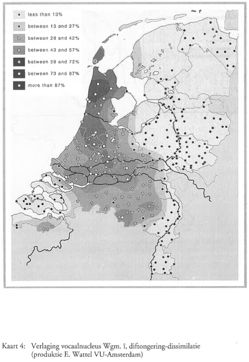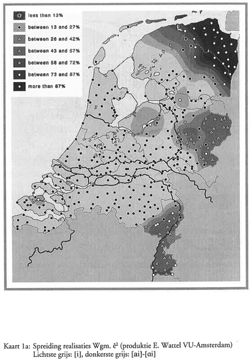Goeman, A. (1994a): Geen Great Vowel Shift in de Nederlandse dialecten, in: G.E. Booij, G. en J. van Marle (red.) (1994): Dialectfonologie [Cahiers van het P.J. Meertens-Instituut 6], Amsterdam: P.J. Meertens-Instituut, 20-59. ●No Great Vowel Shift in the Dutch dialects●
[on the non-existence of a Great (not even a Small) Vowel Shift in Dutch dialects; variance analysis and regression analyses of the dialect data for *Wgm. /î/ and *Wgm. /eo/]
You may download this article as zip file here
Summary
Comparing simply the mapped images of the distribution of diphthongization of WGerm. î and of the heightening WGerm. e2/eo of could easily lead to the conclusion that the two developments are chainlike related to each other. An analysis that takes every single locality into account shows different patterns.
- There is no push or drag chain between WGerm. î and WGerm. ê²/eo in the dialects of the Netherlands, because there is no Small Vowel Change as described by Lass and Johnston.
- There is no direct relationship between the reflexes of WGerm. î and WGerm. ê²/eo. If there exist any relationship, it has come into existence by chance. This is more like Stockwell/Minkova.
- Shortening of WGerm. ê²/eo is caused by its heightening. Shortening is promoted when WGerm. î diphthongizes or dissimilates.
- Accidental gradual shifts (as modelled in the regression models) are more convincing than a categorial abrupt phonological effect (as modelled in the variance analysis). This result contradicts the position of Awedyk/Hamans, who postulate a separation between phonetic and phonological effects. This result matches the positions of Van Loey, Labov and Stockwell/Minkova.
- The diphthongization of WGerm. î is probably no reaction to, or a continuation of, the shortening of WGerm. î. This conclusion contradicts the hypotheses of Franck and Rakers.
- WGerm. ê² and WGerm. eo have not completely been merged in all dialects yet.
- Centralizing diphthongs for WGerm. î and WGerm. ê²/eo still do exist partly in complementary environments. Therefore, an early, threatening merger of the two sounds is not probable, and thus threatening merger -even merger with a third sound, WGerm. î- cannot be the reason for the diphthongization of WGerm. î.
- The form from which the phonetic realization of all representants of WGerm. ê²/eo may be derived most easily is a centralizing diphthong, for example [ɩˑə].


No data for Friesland
Left: Diphthongization of WGerm. î (nucleus lowering; blank regions have /i:/ in all word forms)
Right: Realisation of WGerm. ê² (lightest grey: [i]; darkest grey: [ai] or [ɑi])
Recent discussions
Bridget Samuels (thesis), Nothing to loose but their Chains; Rethinking vocalic Chain Shifting. She concludes that push chains do not extist. The few real candidates are reanalyzed and discarded. Drag or Pull Chains do exist according to her.
Sylvia Moosmüller & Scheutz, H. (2013): Chain shifts revisited: The case of Monophthongisation and E-confusion in the city dialects of Salzburg and Vienna., in: Auer, P., Caro, J., Kaufmann, G. (eds.), Language variation - European Perspectives IV. Amsterdam. Amsterdam: Benjamins, p. 173-186. The supposed Viennese and Salzburg vowel shifts are not chain shifts, they have to be explained in another way.